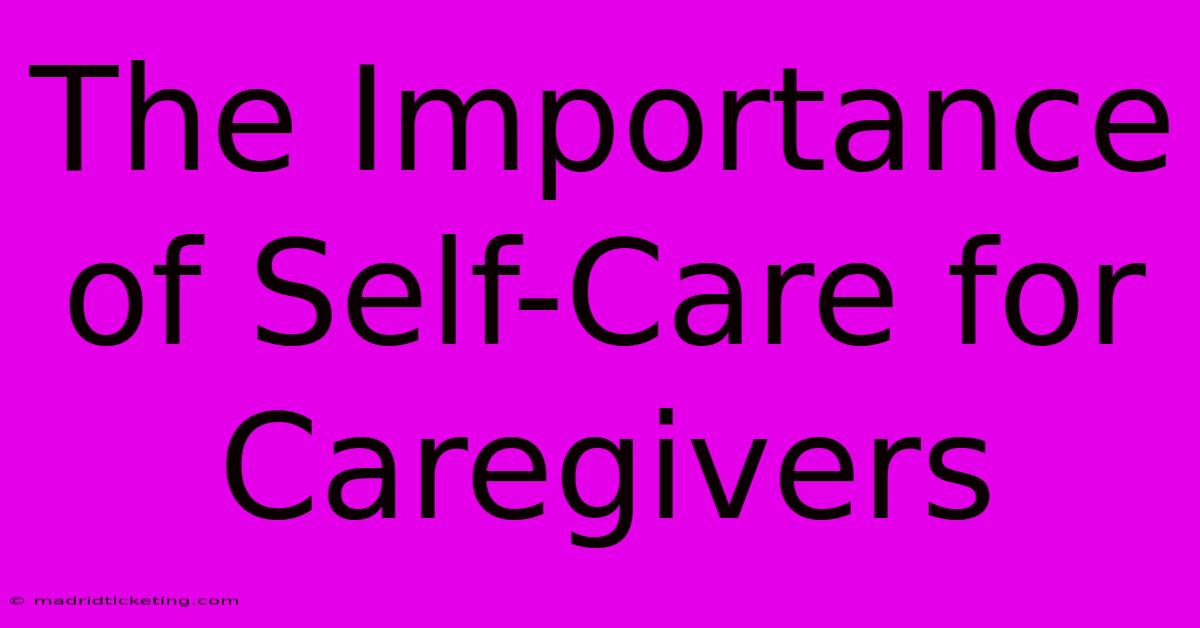The Importance Of Self-Care For Caregivers

Table of Contents
The Importance of Self-Care for Caregivers: Preventing Burnout and Maintaining Well-being
Caregiving is a demanding role, filled with love, sacrifice, and unwavering dedication. Whether you're caring for a child, an aging parent, or a spouse with a chronic illness, the emotional, physical, and mental toll can be significant. This article emphasizes the crucial importance of self-care for caregivers, highlighting the consequences of neglecting one's own well-being and offering practical strategies to prioritize self-care amidst demanding caregiving responsibilities.
The Hidden Costs of Neglecting Self-Care
Many caregivers dedicate themselves entirely to the needs of their loved ones, often putting their own needs last. While this selfless devotion is admirable, it's unsustainable. The consequences of neglecting self-care can be severe, leading to:
- Burnout: This state of emotional, physical, and mental exhaustion is characterized by feelings of cynicism, detachment, and a reduced sense of personal accomplishment. Burnout dramatically impacts your ability to effectively care for your loved one and significantly affects your overall health.
- Physical Health Problems: Chronic stress, lack of sleep, and poor nutrition, common among caregivers, increase the risk of various health issues, including heart disease, high blood pressure, and weakened immunity.
- Mental Health Issues: Caregiving can trigger or exacerbate mental health conditions such as anxiety, depression, and PTSD. The constant pressure and emotional strain can be overwhelming.
- Strained Relationships: Neglecting your own needs can lead to resentment, irritability, and conflict within your personal relationships. You may find yourself less patient and understanding with family and friends.
Recognizing the Signs of Caregiver Burnout
It's important to recognize the warning signs of burnout early on. These may include:
- Unexplained fatigue and exhaustion
- Irritability and anger
- Difficulty concentrating
- Loss of interest in hobbies and activities
- Increased feelings of sadness or hopelessness
- Physical symptoms such as headaches, stomach problems, or sleep disturbances
- Withdrawal from social activities
Prioritizing Self-Care: Practical Strategies for Caregivers
Self-care isn't selfish; it's essential. It's about proactively maintaining your physical, emotional, and mental health to sustain your ability to care for others effectively. Here are some practical strategies to incorporate into your routine:
1. Schedule "Me Time":
Make self-care a non-negotiable appointment in your calendar. Even 15-30 minutes a day dedicated to relaxation or a personal activity can make a significant difference. This could include reading, listening to music, taking a bath, or practicing mindfulness.
2. Prioritize Physical Health:
Eat nutritious meals, get enough sleep, and engage in regular physical activity. Even a short walk can boost your mood and energy levels. Consider joining a support group or finding a caregiver respite program to provide you with some much-needed breaks.
3. Connect with Others:
Maintain social connections with friends and family. Talking to someone who understands your situation can provide emotional support and reduce feelings of isolation. Consider joining a support group for caregivers.
4. Seek Professional Help:
Don't hesitate to reach out to a therapist or counselor if you're struggling. They can provide coping mechanisms and support to navigate the challenges of caregiving.
5. Practice Mindfulness and Relaxation Techniques:
Techniques such as meditation, deep breathing, and yoga can help reduce stress and promote relaxation. Even a few minutes a day can be beneficial.
6. Set Realistic Expectations:
Avoid trying to do everything yourself. Accept help from friends, family, or professional caregivers when needed. Remember, asking for help is a sign of strength, not weakness.
Investing in Yourself is Investing in Your Caregiving Journey
Remember, you cannot pour from an empty cup. By prioritizing self-care, you're not only investing in your own well-being but also ensuring that you can continue to provide the best possible care for your loved one. Implementing these strategies will empower you to navigate the challenges of caregiving with greater resilience, reducing burnout and fostering a healthier, more fulfilling experience for both yourself and the person you care for. Taking care of yourself is not selfish; it's essential. Make self-care a priority, and you will be better equipped to handle the demands of caregiving.

Thank you for visiting our website wich cover about The Importance Of Self-Care For Caregivers. We hope the information provided has been useful to you. Feel free to contact us if you have any questions or need further assistance. See you next time and dont miss to bookmark.
Featured Posts
-
Learn Something New Educational Activities For Moms And Daughters
Apr 04, 2025
-
Trader Joes Madras Lentils Your New Favorite Side
Apr 04, 2025
-
Relax And Rejuvenate Mothers Day Spa Day In Dr
Apr 04, 2025
-
Why You Need The Real Madrid 2016 17 Third Kit In Your Collection
Apr 04, 2025
-
Sweet Treats For My Aunts Mothers Day
Apr 04, 2025
